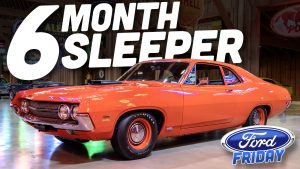Welcome to Sin City for the first “real” race of the season at one of the most unique intermediate tracks on the schedule – Las Vegas Motor Speedway. The trickiest part about this place for both engineers and drivers is the bumps. Out here in the desert, the temperature changes from day to night are fairly extreme, from scorching heat during the day to freezing cold at night. This has created a fantastically challenging racing surface over the years.
[Ed note: As an experiment, we’ve been watching this season’s NASCAR Xfinity Series races together in our Discord. We had Bozi around the first week and Alanis last week. During the conversation on Saturday a new name appeared: Aeden McHugh. He’s not just one of Alanis’s many friends, he’s also the engineer for the #1 JR Motorsports car driven by Sam Mayer. Not only did Aeden provide race updates, he provided them from his pit box as the race was happening!
Unprompted, Aeden sent over a write-up from the team plane explaining why Las Vegas is such a special race and what to watch for this weekend. It’s great, I learned a ton. We are going to have another awesome guest who is working this weekend for the Discord chat, none other than Brad Perez. Since we have this post up today I’m going to have a post up tomorrow afternoon reminding everyone to come watch the race with us around 5:00 PM ET on Saturday with details on Brad. -MH]
On entry to both corners there is a series of what we call washboard bumps, think of the whoops section on a supercross track. Looking at the picture below you can see where the track is darker from the rubber on the front side of the bump and lighter on the back side of it.

The most important aspect to building a car that gets around Las Vegas well is timing the suspension and the shocks with the frequency of loading and unloading through the bumps to try and maintain consistent contact patch load. The placement of the bumps themselves is also tricky for drivers. Imagine the track was freshly repaved and perfectly smooth and picture the line that a driver would take into this corner. The way that Las Vegas Motor Speedway has aged, the roughest part of the track falls right over the top of this ideal racing line. In order to try and drive around them the drivers have to take a huge arc into the corner, which is great and all, but that promotes a ton of corner entry oversteer, so the teams must find a balance between tight enough to get into the corner but free enough to rotate through the middle and exit.
Behind the scenes peek at the @JRMotorsports No. 1 Club Car Chevrolet.???? Who's ready to see this beauty in action on Saturday? pic.twitter.com/5VDbCszKxX
— Club Car (@clubcar) February 29, 2024
Las Vegas Motor Speedway is also what we consider a high fall-off track. The asphalt is fairly old and the tire compound is decently soft, so lap times will drop off considerably. The track will take on a good deal of rubber over the course of the race weekend. This track evolution generally pushes cars in the understeer direction from session to session and run to run, so even if you hear the driver report that the car is balanced and driving great don’t be surprised to see the crew making an adjustment during the pit stop to stay ahead of the track. Otherwise, by the end of the next run their neutral racecar will be understeering massively.

A fun side effect of this constantly evolving track is the migration of the racing line. As the track takes rubber and the car’s handling starts to change drivers will quickly begin to search for different racing lines. They will look for different corner radii and paths through the bumps to manage their car. Usually, the groove will work its way up to the wall by the midpoint of the race.
For those new to stock car racing, we call this ripping the boards and it’s badass. When a car is in yaw during a corner, the nose is further away from the wall than the tail creating a giant funnel that sucks air in between the car and the wall. The air in this funnel is combined with the outwashing air off the right front fender to create a kind of cushion that forces the car towards the center of the corner and holds it off the wall (check out the video below at about 4:30 in).
The best drivers can enter the corner right on the wall and hold a constant proximity to it throughout the entire corner. Drivers who are more timid might pull down half a car width on entry and let the car float up to it. The disadvantage of letting the car float up to the wall is twofold.
Firstly, the aero effect is not helping them throughout the whole corner. Secondly, drivers will have to take a slower entry speed because they’re just kind of guessing when the air will build up enough to catch the car. If they guess wrong and enter too fast they will blow through the air dam and make contact with the wall. Guessing wrong on the slow side obviously protects the racecar but leaves precious laptime on the table.
This aero effect is very sensitive to wall proximity and when a driver is running the fence, they have a much greater ability to change the cars balance than anyone on the pit wall does. Closer to the wall equals more understeer and vice versa. A 5” (13 cm) difference in wall proximity will shift the balance of the car tremendously.

When a car is built to run the fence, such as a team might build for Homestead-Miami Speedway, it will be almost undrivable with the oversteer anywhere more than one meter off the wall but handle perfectly when you put it right on the boards.
Overall, Las Vegas Motor Speedway is a combination of all of the things that make intermediate track stock car racing great. Lap time fall-off and constant track evolution creates comers and goers throughout a run which pairs beautifully with the ability for drivers to run multiple lines from the apron all the way to the fence.









Just wanted to say that because of this article I actually tuned into a portion of this race. I hadn’t watched a NASCAR race in 20 years. Appreciate the insights!
This is great! I never watched NASCAR much at all, and not lately, but this is fascinating.
This is squarely in the “I didn’t even know what I didn’t know.” category, and I love that.
Racing would be better is all race tracks were bumpier.
Neat! Didn’t know that this was a thing! Thanks for the aero and resulting strategy lesson!
Brad Perez! I am currently wearing my Bread Rocket hoodie.
I live here. I’m guessing that, just like the city and county roads, the paving was done by Las Vegas Paving Co. So the track is just as bad as the streets.
Only if it cost 2x what it should have and took 3 extra years to pave while somehow blocking traffic everywhere in a 9 mile radius and lowering speed limits to some unreasonable limit nobody follows.
This is great. There are so many more aspects to stock car racing than people normally think of.
I would still probably send it straight through the bumps, which is… one of many reasons why I’m not a professional race car driver.
Aedan! Extremely cool to get this level of detail in writing.
Yes. Most interesting article of a bunch entertaining ones today. I have a general awareness that stock car racing involves the black arts; fun to learn a bit about them. Would enjoy more.